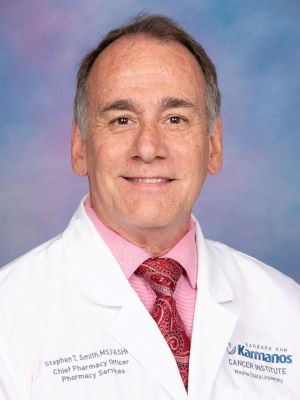
Stephen Smith
PHARMACY
Graduated in 1988, Master’s in Health Pharmacy Administration
Chief Pharmacy Officer, Karmanos Cancer Institute
Q: Why did you choose Wayne State University?
A: As a young pharmacist, I became aware of the master’s in science Hospital Pharmacy Administration at Wayne State University because several of my pharmacy colleagues were enrolled in this program. The program held classes mostly in the evenings which dovetailed nicely into full-time employment as well as a hectic, young family life. Completion of degree requirements was flexible, so I could take classes at a more relaxed pace. Many of the clinical instructors were Pharmacy Directors that I had met through professional pharmacy organizations. They encouraged me to investigate and pursue this master’s degree program.
Q: What inspired you to pursue Pharmacy?
A: My childhood friend’s grandfather was a pharmacist store owner. My friend and I often visited his grandfather in his store. On occasion, Mr. McDonald would have us assist him in the preparation of prescriptions. I was fascinated by how he would mix powders and liquids to compound a prescription for a patient. This stimulated my interest in chemistry and ultimately, pharmacy.
Q: Who was your most memorable Professor?
A: Dr. David Solomon, PharmD. was the director of our MS program. He would always make time in his busy schedule (he was also Director of Pharmacy at Detroit Receiving Hospital) to talk about my career development. He would recommend pursuing different projects to broaden the student experience. He would often refer students to other clinical faculty thereby broadening our professional networks whether we realized it or not.
Q: What was your most challenging class?
A: Human Resource Management. As a required class for the MS program, this class was my first venture outside of pharmacy/medical topics for class work. It took some time to wrap one’s head around non-medical topics.
Q: Share some reflections about your time at Wayne State:
A: It was great spending time and developing relationships with colleagues with similar goals pursuing the skill set to run a Hospital Pharmacy department. I have been fortunate to have mentored many WSU Pharmacy students over the years and have had some wonderful conversations about life and goals.
Q: In your opinion, what is one of the biggest changes that has occurred in your profession since graduating?
A: Pharmacy is ever changing, I have been fortunate to be constantly exposed to residents, students, and new pharmacists who seem to pose the most interesting questions and keep you on your toes. The continued learning has always stimulated my thoughts and understanding which I feel has led me to design better programs and embrace more outside-of-the-box thinking.
Q: Share a career highlight or summary:
A: I am very thankful for the numerous opportunities presented to me throughout my career. I was well prepared to tackle many problems based on the education received during my undergraduate and graduate programs. The professional relationships developed through our pharmacy colleges, through my employment, and through our pharmacy organizations are valued and treasured. I thank all of you for making me a better pharmacist.
The Doctor of Pharmacy program at Wayne State University is a four-year curriculum in the heart of Detroit. Approximately 100 students are enrolled in each year of the program. WSU Applebaum information meetings for prospective students take place at 6 p.m. on the first Tuesday of each month. The application process or the Doctor of Pharmacy program begins each July.
An anchor in urban health care
The Eugene Applebaum College of Pharmacy and Health Sciences is built on more than 100 years of tradition and innovation in the heart of Detroit. We have grown deep roots in our city, harnessing its powerhouse hospital systems and community service organizations as vibrant, real-world training grounds for students, with an ongoing focus on social justice in health care. And our research at all levels – from undergraduates to veteran faculty members – translates into creative solutions for healthier communities.
Wayne State University is a premier urban research institution offering approximately 350 academic programs through 13 schools and colleges to nearly 24,000 students.